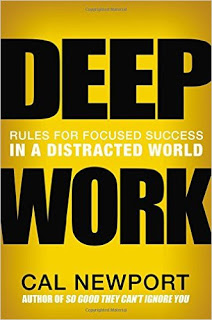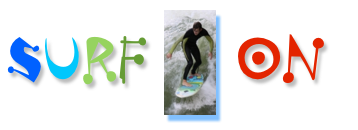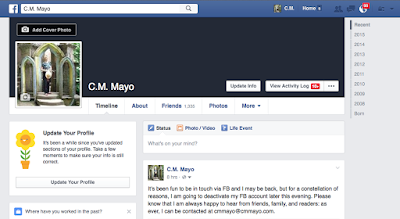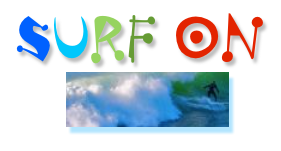

Find out about a must-read book, a must-read blog, and a must-watch TED Talk by Georgetown University Associate Professor of Computer Science Cal Newport, all in one handy post at his Study Hacks Blog, “Quit Social Media.”
What Newport says in that post is provocative– undoubtedly just the title will rub many people’s fur the wrong way, and no surprise, it already has many commenters a-huffing & puffing.
Here is my comment on Cal Newport’s post:
Thank you for this blog, for your TED Talk, and for your books, especially Deep Work. I am a writer with 2 finance books published under another name, plus 4 literary books, plus an anthology– all of which is to say, I understand the nature and immense benefits of deep work.
But dealing with the Internet… that has been a challenge for me over the past several years, and especially when all these shiny new social media toys seemed to be so necessary and (apparently) effective for promoting one’s books. Every publicist, marketing staff, my fellow writers, all seem slaves now to social media. I can assure you, every writers conference has a panel on book PR and social media.
For a while, at the enthusiastic urging of one of my writer-friends (by the way, a best-selling and very fine historical novelist), I maintained a Facebook page, but when I realized what a time-suck it was, and how FB made it intentionally and so deviously addictive, I deactivated my account. I had also come to recognize that people addicted to FB, as seemed to be not all but most of my “FB friends,” often as they might “like” and comment on my posts there, are probably not my readers. (My books require sustained focus; I admit, they can be challenging.) I deactivated my FB more than a year ago, and I breathe a sigh of relief about it every blessed day.
As for your book, Deep Work, much of what you say was already familiar to me from my own experience as a writer, but I appreciated the reminders, especially in light of these contemporary challenges to sustaining focus. What was especially interesting and intriguing to me was the new cognitive research you mention. Next time I teach a writing workshop you can be sure that Deep Work will be on the syllabus.
Do I miss interacting with friends and family on FB? Yes, but now I have more time for higher quality interpersonal interactions, such as, say, emails, telephone conversations, and–Land o’ Goshen!!– actually getting together in person.
However, for the record, I’m not (yet) giving up the three social media tools I still use, LinkedIn, Twitter and YouTube, because:
(1) With LinkedIn and Twitter I appreciate having a way to contact certain individuals when email is not a workable option (nieces and nephews, you know who you are!);
(2) I appreciate the broadcast opportunity, modest as it is. Check out my YouTube channel here. As for Linked In and Twitter, usually I just zip in to tweet a blog post or a podcast, then out, and not every day;
UPDATE: Twitter, meh. Now, with the rarest of exceptions, I tweet once a month, as a courtesy to the authors who do a Q & A for Madam Mayo blog.
UPDATE Sept 2021: The world would be a better place without Twitter. As for YouTube, it has a lot to answer for its ham-handed censorship in 2020-2021. My channel is still there only because it hasn’t been a priority for me at this time to move the content to another platform.
(3) I turned off their notifications;
(4) I do not find these services addictive, as I did Facebook, hence, I am not tempted to constantly check them.
In sum, for me– and of course, this might be different for you– at this time– and no guarantees for the future– the benefits of maintaining my LinkedIn, Twitter, and YouTube accounts outweigh the costs.
SPEAKING OF COSTS
Speaking of costs, one of the vital arguments Cal Newport makes in Deep Work is that pointing out the benefits of utilizing any given social media tool is not enough; one must also take into full account its opportunity costs in your actual practice. Oftentimes these costs are devastating. But fear of “missing out,” fear of admitting that one could have done so much better than to have spent weeks, months, even years of precious hours agog at mindless trivia– in short, the fear and pride behind cognitive dissonance– make many otherwise highly intelligent people blind to this simplest of common-sense arguments.
>> Speaking of cognitive dissonance, I have plenty to say about that in my wiggiest book review yet.
DOES “SOCIAL MEDIA” INCLUDE BLOGS?
One question that popped up in the comments there at Study Hacks blog was about the definition of “social media”: Does it include blogs? Ironically, since he publishes comments and on occasion responds to them, I consider Cal Newport’s “Study Hacks Blog” to be social media. I do not consider this blog, “Madam Mayo,” to be “social media,” however, because an eon ago I closed the comments section.
That said, dear thoughtful and civilized reader, your comments via email are always welcome. I invite you to write to me here.
P.S. My recommended reading lists for my writing workshops are here. You will find Cal Newport’s excellent Deep Work on my list of works on Creative Process. And you can read my review of Cal Newport’s earlier book, So Good They Can’t Ignore You, here.

This Writer’s Distraction Free Smartphone (DFS):
First Quarter Update
Great Power in One: Miss Charles Emily Wilson
Find out more about C.M. Mayo’s books, shorter works, podcasts, and more at www.cmmayo.com.



